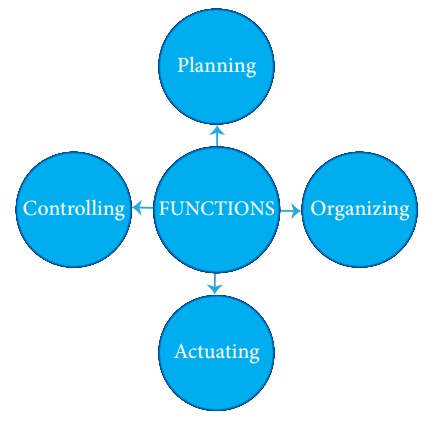Chapter: 12th Nursing : Chapter 12 : Nursing Education and Management
Nursing Management
Management
Introduction:
Management is the scientific art of achieving the results or goals
by effective utilization of the resources. Management generally lays emphasis
on control. i.e., control of personnel, control of cost, time, salaries,
overtime, inventory etc. Management is required to plan, organize, co-ordinate
and control the affairs of the organization. It brings the human and material
resources together and motivates people for achievement of the objectives of
the organization. Management is an universal process in all organized social
and economic activities.
Definitions
Management is an art of getting things done through and with
people in formally organized groups. – Harold Koontz.
Management is defined as a process by which co-operative group
directs action towards common goals.– Joseph Massie.
Definition of nursing management
Nursing management consists of the performance of the leadership
functions of governance and decision-making within organizations employing
nurses. It includes processes common to all management like planning,
organizing, staffing, directing and controlling.
What is ward management
Ward management is the duty of the head nurse, who is the
administrative officer of the hospital. The nursing care is needed during
admissions and discharge of patients, doctors’ rounds, and drug administration
and also during operation theatre administration.
Golden rules for a good ward management
·
Early arrival to duty.
·
Make
a note:
Write down activities for the day.
·
Time
plan: Estimate
how long it will take to accomplish a task.
·
Prioritize
task: There
are list of tasks for the day, there is need to prioritize based on
urgency.
·
Follow
schedule: Ignore
tasks that are not on the list, to maximize best use of time.
·
First
thing first/Learn to say “No” with compassion: Attend to life
threatening situation first.
·
Take
a break: Need
to relax during stressful situations.
·
Be flexible
·
Encourage
Yourself: Appreciate
yourself for the achievements made so far.
Elements of ward management
·
Patient care
·
Personnel management
·
Ward sanitation and
provision of therapeutic environment
·
Supply the equipment
·
Interpretation of policies
and procedures.
Principles of ward management
Apply the principles of administration in ward management.
1. Henri
Fayol’s 14 Principles of management
• Division of work :
·
Fayol has stressed on
the specialization of jobs.
·
Subdivision of work makes
it simpler and results in efficiency.
·
It also helps the
individual in acquiring speed, accuracy in his performance.
2. Authority and Responsibility.
·
Authority is the power
to take decisions.
·
Responsibility is the
obligation to complete the job assigned.
·
There should be balance
between the two i.e. they must go hand in hand.
3. Unity of command.
·
A sub-ordinate should
receive orders and be accountable to one and only one boss at a time.
·
In other words, a
sub-ordinate should not receive instructions from more than one person.
·
It creates harmonious
relationship between superiors and sub-ordinates.
4. Unity of Direction
·
One head one plan which
means that there should be one plan for a group of activities having similar
objectives.
·
Related activities
should be grouped together.
·
According to this
principle, efforts of all the members of the organization should be directed
towards common goal.
5. Equity
·
The employees should be
treated with kindness and equity.
·
Manager should be fair
and impartial while dealing with the subordinates.
·
Should give similar
treatment to people of similar position.
·
Should not discriminate
with respect to age,caste,sex, religion,relation etc.
6. Principle of order
·
It refers to the
systematic arrangement of men and material in a fixed place for everything and
everyone in the organization.
·
The right materials and
the right employees are necessary for each organizational function and
activity.
7. Discipline
• Discipline means sincerity, obedience,respect of authority and observance of
rules and regulations of the enterprise.
·
This applies that
subordinate should respect their superiors and obey their order.
8. Principle of initiative
Workers should be encouraged to take initiative in the work assigned
to them.
9. Remuneration
·
Remuneration to be paid
to the workers should be fair, reasonable, satisfactory and rewarding of the
efforts.
·
Wages should be
determined on the basis of cost of living, work assigned, financial position of
the business.
·
Employees must be paid
adequately, or give them maximum satisfaction.
10. Stability of Tenure
·
Employees should not be
transferred frequently or terminated.
·
Time is required for an
employee to get used to a new work and succeed in doing it well.
11. Scalar chain
·
The chain of superiors
ranging from the ultimate authority to the lowest.
·
Every order,
instructions, messages, requests, explanation etc. has to pass through scalar
chain.
·
Sub-Ordination
of individual interest to general interest.
·
Importance given to
organization.
·
Individual must
sacrifice his own interests sometimes for bigger interests of organization.
·
Organization is bigger
than individual.
·
Interest of the
organization which supersedes the interest of the individuals.
13. Esprit De’Corps
·
It means union is
strength.
·
Teamwork is
fundamentally important to an organization.
·
Team work inspires
workers to work harder.
14. Centralization and De-centralization
·
Centralization is a
situation in which top management retains most of the decision making
authority.
Anything which
increase role of
subordinates is decentralization and
anything which decreases it, is centralization.
Sharing authority downwards is
decentralization.
Basic functions/ Elements of Management
Management has been described as a social process involving
responsibility for economical and effective planning and regulation of
operation of an enterprise in the fulfillment of given purposes. It is a
dynamic process consisting of various elements and activities.
According to George and Jerry. Four fundamental functions of
management are

According Henry Fayol
To manage is to forecast and plan, to organize, to command and to
control.
Luther Gullick : POSDCORB
P - planning
O - Organizing
S - Staffing
D - Directing
C - Controlling / Monitoring
R - Recording and Reporting
B - Budgeting.
Related Topics